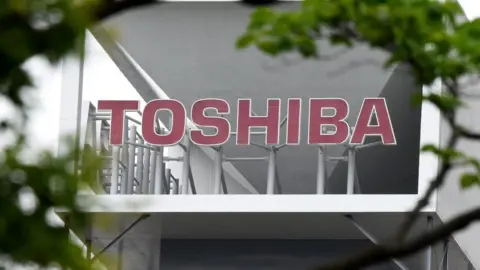Toshiba sues Western Digital over memory chip sale
 Getty Images
Getty ImagesToshiba is suing Western Digital for 120bn yen ($1bn; £835m), accusing it of interfering in the attempted sale of its flash memory business.
The Japanese giant is offloading the unit, which makes chips for smartphones and laptops, to cover huge losses in its US nuclear division.
It has so far failed to clinch a sale to its preferred buyer, a group of US, South Korean and Japanese investors.
Western Digital, a partner of Toshiba, objects to that proposed deal.
The US firm, which jointly runs Toshiba's main semiconductor plant, has been feuding bitterly with its Japanese partner, and has sought a US court injunction to prevent any deal that does not have its consent.
Exaggeration
Toshiba said Western had "continually interfered with the bid process" and "exaggerated" the amount of say it had in whether any sale went through.
It also announced that it had decided to stop Western Digital staff from accessing information about the two companies' joint venture.
Earlier on Wednesday Toshiba said it had failed to complete a deal to sell the chip unit to a consortium of US, South Korean and state-backed Japanese investors, reportedly worth about $18bn (£14.1bn). It had hoped to seal the sale before its AGM on Wednesday.
On Tuesday, Western resubmitted its own bid for the chip division, which had been unsuccessful first time around.
Taiwan's Foxconn says it has not given up on buying the chip unit, despite it also having a bid rejected.
Why is the sale necessary?
Put simply Toshiba desperately needs the funds. In April, Toshiba said its future as a financially viable business may be in doubt. And this week the ailing electronics giant said its losses for 2016 may be greater than it had previously forecast.
It now predicts a net loss of 995bn yen (£7bn) for the year to March, up from its earlier estimate of 950bn yen.
The bulk of those losses will be a one-off loss at its US nuclear division Westinghouse which has filed for Chapter 11 bankruptcy in the US.
It was the latest blow to the firms' finances and reputation.
An accounting scandal that was uncovered in 2015 led to the resignation of the chief executive and several senior managers. The company was found to have inflated the previous seven years' profits by $1.2bn.
